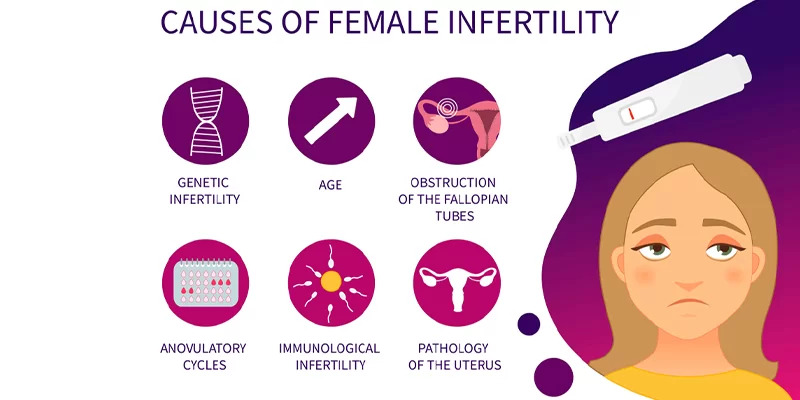Female infertility can stem from ovulation issues, blocked fallopian tubes, uterine problems, hormonal imbalances, age-related factors, PCOS, and lifestyle choices. in Female infertility, Medical intervention can often address these challenges for conception.
- Ovulation Disorders: Irregular or absent ovulation can hinder the release of eggs for fertilization.
- Fallopian Tube Blockage: Blocked or damaged fallopian tubes can prevent sperm from reaching the egg or the fertilized egg from reaching the uterus.
- Uterine Issues: Conditions such as fibroids, polyps, or abnormalities in the uterus can interfere with embryo implantation.
- Endometriosis: This condition causes tissue similar to the uterine lining to grow outside the uterus, leading to fertility problems.
- Hormonal Imbalances: Imbalances in hormones like estrogen and progesterone can disrupt the menstrual cycle and ovulation.
- Age-related Factors: As women age, their fertility declines, primarily due to a decrease in the number and quality of eggs.
- Polycystic Ovary Syndrome (PCOS): PCOS can cause irregular periods, ovarian cysts, and hormonal imbalances, impacting fertility.
- Pelvic Inflammatory Disease (PID): Infections in the reproductive organs, such as PID, can lead to scarring and damage, affecting fertility.
- Thyroid Disorders: Thyroid issues can disrupt hormone levels and menstrual cycles, impacting fertility.
- Lifestyle Factors: Factors like smoking, excessive alcohol consumption, obesity, poor nutrition, and high stress levels can also contribute to female infertility.
Identifying and addressing these underlying causes with the help of medical professionals can often lead to successful fertility treatments and enable women to achieve their dream of having a child.




.png)

Comments